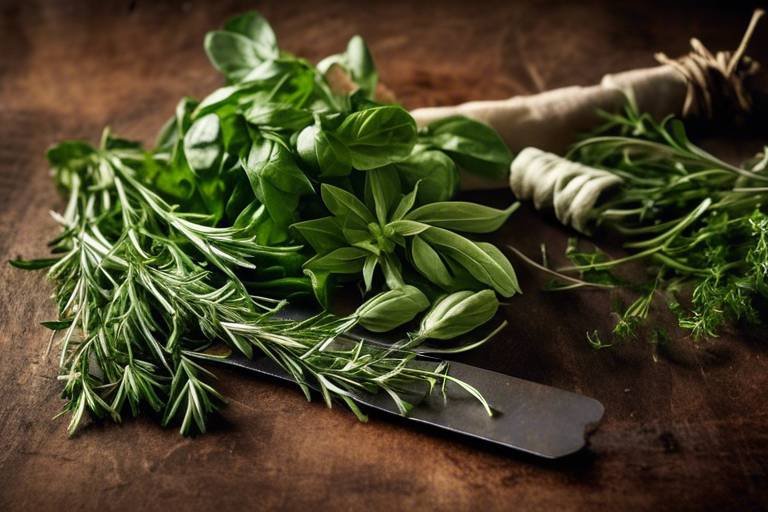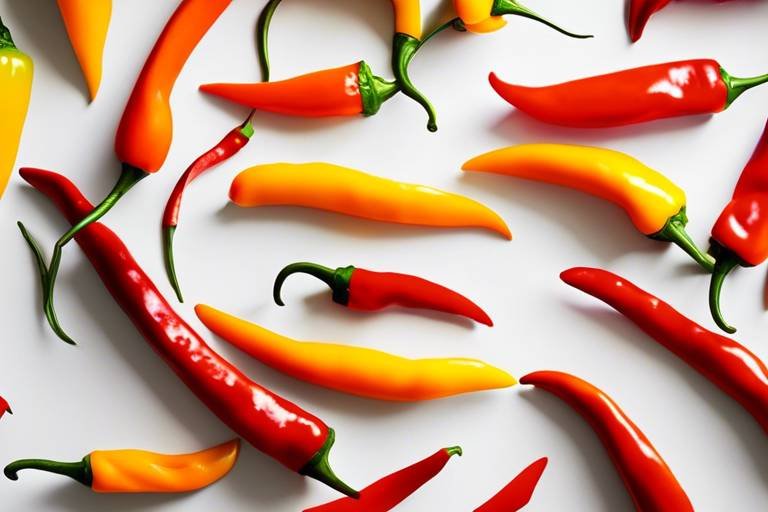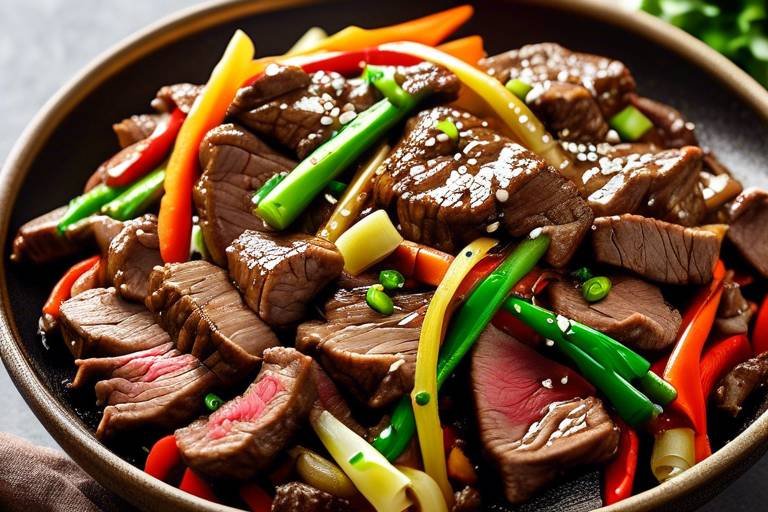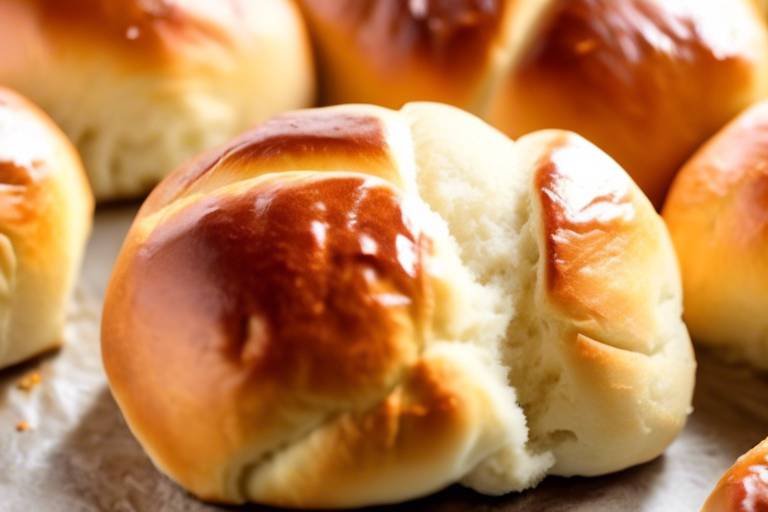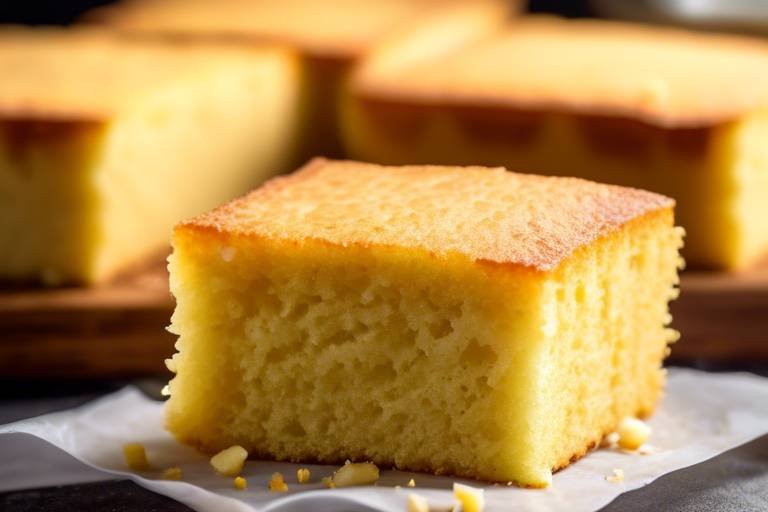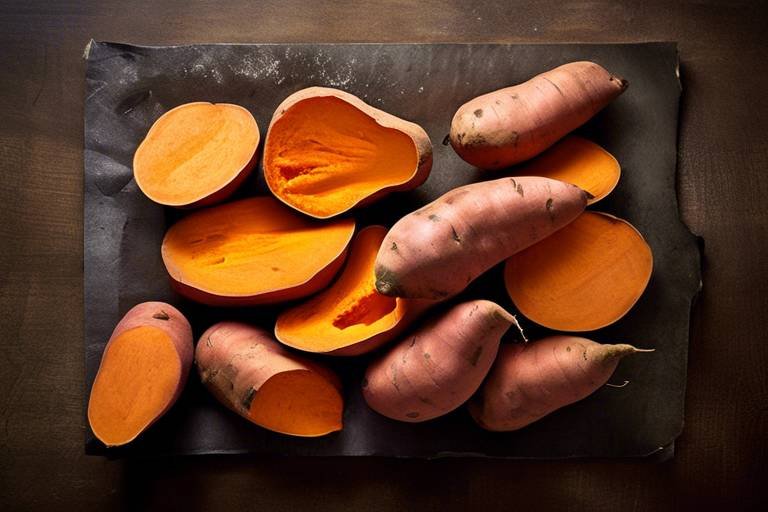10 Essential Tips for Cooking with Seasonal Herbs
Seasonal herbs are nature's way of adding a burst of freshness and flavor to your dishes, elevating them to a whole new level. Whether you are a seasoned chef or a home cook looking to enhance your culinary skills, incorporating seasonal herbs into your cooking can make a world of difference. Here are 10 essential tips to help you make the most of seasonal herbs and create dishes that will surprise and delight your taste buds.
1. Choose the Right Herbs: When cooking with seasonal herbs, it's essential to select the right herbs that complement the flavors of your dish. Consider the taste profile of each herb and how it will enhance the overall taste of your recipe.
2. Use Fresh Herbs: Fresh herbs pack a more intense flavor compared to dried ones. Whenever possible, opt for fresh seasonal herbs to add a vibrant and aromatic touch to your dishes.
3. Experiment with Pairings: Don't be afraid to experiment with different herb and ingredient pairings. The right combination can create a symphony of flavors that will surprise and delight your palate.
4. Adjust Herb Quantities: Herbs can vary in intensity, so it's crucial to adjust the quantities based on the herb's strength and the dish you are preparing. Start with a small amount and taste as you go.
5. Timing is Key: Add delicate herbs like basil and cilantro towards the end of cooking to preserve their fresh flavors. Hardier herbs like rosemary and thyme can withstand longer cooking times.
6. Utilize Herb Stems: Don't discard herb stems! They are packed with flavor and can be used to infuse broths, sauces, or even to make herb oils.
7. Get Creative with Herb Infusions: Experiment with herb-infused oils, vinegars, and syrups to add a unique twist to your dishes. These infusions can be used in dressings, marinades, or drizzled over finished dishes.
8. Balance Flavors: Herbs can add depth and balance to a dish. Use them to cut through rich or fatty flavors, brighten up a dish, or add a fresh finishing touch.
9. Consider Texture: Think about the texture of the herbs you are using. Finely chop delicate herbs for a subtle flavor infusion, while larger leaves can be used as a garnish or in salads for a burst of freshness.
10. Store Herbs Properly: To prolong the shelf life of your seasonal herbs, store them correctly. Some herbs can be stored in a glass of water in the fridge, while others are best preserved by drying or freezing.
By following these essential tips, you can unlock the full potential of seasonal herbs in your cooking and create dishes that are not only delicious but also visually appealing and aromatic. Let the flavors of nature inspire your culinary creations!

Understanding Seasonal Herbs
Seasonal herbs are a delightful addition to any dish, offering a burst of fresh flavors that can elevate your culinary creations to new heights. Understanding seasonal herbs involves knowing which herbs are at their peak during different times of the year, allowing you to make the most of their unique tastes and aromas.
Each season brings a variety of herbs that thrive in specific weather conditions, resulting in optimal flavor development. For example, delicate herbs like basil and cilantro flourish in the warm summer months, while robust herbs like rosemary and thyme thrive in the cooler fall and winter seasons.
By understanding the seasonal availability of herbs, you can harness their full potential in your cooking, ensuring that your dishes are bursting with vibrant flavors that complement the ingredients you use.
Moreover, seasonal herbs offer a natural way to enhance the taste of your dishes without relying heavily on artificial flavorings or additives. Their freshness and potency can transform a simple meal into a culinary masterpiece, impressing your family and guests with every bite.
Whether you are a seasoned chef or a novice cook, grasping the essence of seasonal herbs will open up a world of possibilities in the kitchen, allowing you to experiment with different flavors and create unique dishes that reflect the changing seasons.

Growing Your Own Herb Garden
Discover how to make the most of seasonal herbs in your cooking with these essential tips that will enhance the flavors of your dishes and elevate your culinary skills.
Have you ever dreamed of having a lush garden filled with fragrant herbs just a few steps away from your kitchen? Growing your own herb garden can turn this dream into a reality. Imagine stepping outside and plucking fresh basil leaves or snipping some rosemary to add a burst of flavor to your dishes. Not only does it provide convenience, but it also saves you money on buying herbs from the store every time you need them.
When you grow your own herb garden, you have control over the quality of the herbs you use. No more worrying about pesticides or other chemicals that might be present in store-bought herbs. You can ensure that your herbs are grown organically and harvested at their peak freshness, enhancing the taste of your culinary creations.
Creating your herb garden is like curating a mini jungle of flavors right in your backyard or even on your windowsill. It's a delightful experience to watch your herbs grow, knowing that each leaf or sprig holds the potential to transform a simple dish into a culinary masterpiece. The satisfaction of nurturing and harvesting your herbs is incomparable to anything else.
If you're new to gardening, don't worry! Herbs are generally low-maintenance plants that thrive in various conditions. Whether you have a spacious garden or a small balcony, there's always room for a herb garden. With a little sunlight, water, and care, you can enjoy a bountiful harvest of fresh herbs throughout the growing season.
Imagine the joy of adding a handful of freshly picked herbs to your salads, soups, or marinades, infusing them with vibrant flavors that elevate your dishes to a whole new level. Growing your own herb garden is not just about cultivating plants; it's about cultivating a deeper connection to nature and the food you prepare.

Harvesting and Storing Herbs
Discover how to make the most of seasonal herbs in your cooking with these essential tips that will enhance the flavors of your dishes and elevate your culinary skills.
When it comes to harvesting and storing herbs, timing is key. The best time to harvest herbs is in the morning after the dew has dried but before the sun gets too hot. This is when the essential oils in the herbs are most concentrated, ensuring maximum flavor. After harvesting, gently wash the herbs and pat them dry with a paper towel to remove any excess moisture.
Storing herbs properly is essential to maintain their freshness and flavor. One common method is to store fresh herbs in a glass of water, similar to a bouquet of flowers, and cover them loosely with a plastic bag. This helps keep the herbs hydrated and prolongs their shelf life. Alternatively, you can wrap the herbs in a damp paper towel and store them in a resealable plastic bag in the refrigerator.
If you have an abundance of herbs, consider drying them for later use. Hang them upside down in a warm, well-ventilated area until they are completely dry. Once dried, store them in airtight containers away from direct sunlight to preserve their flavor. Another option is to freeze herbs by chopping them and placing them in ice cube trays with a little water or oil for easy portioning in future dishes.
For longer-term storage, you can create herb-infused oils or vinegars. Simply pack a jar with fresh herbs, cover them with oil or vinegar, and let them infuse for a few weeks in a cool, dark place. The resulting infused oils and vinegars not only add flavor to your dishes but also make lovely gifts for fellow food enthusiasts.
Properly harvested and stored herbs can be a game-changer in your cooking, allowing you to enjoy the flavors of your favorite herbs all year round. Experiment with different methods of preservation to find what works best for you and elevate your dishes with the vibrant taste of seasonal herbs.

Pairing Herbs with Ingredients
Discover how to make the most of seasonal herbs in your cooking with these essential tips that will enhance the flavors of your dishes and elevate your culinary skills.
When it comes to pairing herbs with ingredients, it's like creating a symphony of flavors in your dishes. Just like a conductor harmonizes different musical instruments, you can blend herbs with various ingredients to create a masterpiece on your plate. Think of herbs as the seasoning that can elevate the taste of your dishes to new heights. For example, the freshness of basil complements the acidity of tomatoes in a classic Caprese salad, while the earthiness of rosemary enhances the flavor of roasted potatoes. Experimenting with different herb and ingredient combinations can lead to surprising and delightful culinary creations that will leave your taste buds tingling with excitement.

Using Herbs in Different Cuisines
Discover how to make the most of seasonal herbs in your cooking with these essential tips that will enhance the flavors of your dishes and elevate your culinary skills.
When it comes to using herbs in different cuisines, the possibilities are endless. Imagine the vibrant flavors of Italian dishes with the freshness of basil, or the aromatic blend of coriander in spicy Indian curries. Each cuisine has its own unique way of incorporating seasonal herbs to bring out the best in their traditional dishes.
Think of herbs as the painters of the culinary world, adding splashes of color and depth to every dish they touch. Just like an artist carefully selects their palette, a chef chooses the perfect herbs to complement the flavors of their cuisine. Whether it's the earthiness of rosemary in Mediterranean cuisine or the zing of lemongrass in Thai dishes, herbs play a crucial role in creating a symphony of flavors.
Exploring different cuisines allows you to broaden your culinary horizons and experiment with new flavor combinations. Have you ever tried the delicate balance of mint in Middle Eastern cuisine or the boldness of cilantro in Mexican dishes? By incorporating herbs from various cultures into your cooking, you can create dishes that surprise and delight your taste buds.
Herbs not only add flavor but also tell a story of the region they come from. They carry with them the essence of a culture, reflecting the landscapes, traditions, and culinary heritage of a particular cuisine. Using herbs in different cuisines is like embarking on a culinary journey around the world, experiencing the richness and diversity of flavors that each culture has to offer.
So, the next time you step into your kitchen, think beyond the familiar and explore the vast world of herbs waiting to elevate your dishes to new heights. Let the aromatic herbs guide you on a culinary adventure where each bite tells a tale of flavor, tradition, and creativity.
If you have any questions about cooking with seasonal herbs or need more tips on how to incorporate them into your dishes, check out these commonly asked questions:
- Q: What are the best herbs to use in Italian cuisine?
- Q: How can I preserve herbs for future use?
- Q: Are there any herbs that pair well with seafood dishes?
- Q: Can I use dried herbs instead of fresh ones in recipes?
Feel free to explore these questions and delve deeper into the world of seasonal herbs to enhance your culinary skills and create dishes that are bursting with flavor.

Preserving Herbs for Later Use
Discover how to make the most of seasonal herbs in your cooking with these essential tips that will enhance the flavors of your dishes and elevate your culinary skills.
When it comes to preserving herbs for later use, there are several techniques you can employ to ensure you have access to their flavors even when they are out of season. One common method is drying herbs, which involves hanging them upside down in a warm, dry place to remove moisture and preserve their taste. Another option is freezing herbs, either by chopping them and placing them in ice cube trays with water or oil, or by freezing whole sprigs for later use in cooking.
If you prefer a more flavorful approach, consider making herb-infused oils or vinegars. By infusing oils with herbs like rosemary, thyme, or basil, you can create aromatic oils perfect for drizzling over salads or dipping bread. Similarly, herb-infused vinegars add a tangy kick to dressings and marinades, enhancing the overall taste of your dishes.
For those who enjoy herbal teas and infusions, drying herbs like mint, chamomile, or lavender can provide a fragrant base for soothing beverages. Simply steep the dried herbs in hot water to release their flavors and enjoy a comforting drink that not only tastes great but also offers various health benefits.
By preserving herbs using these methods, you can extend the lifespan of your favorite seasonal herbs and continue to enjoy their unique flavors long after their growing season has passed.

Herbal Infusions and Teas
When it comes to herbal infusions and teas, the possibilities are endless. Imagine steeping fresh seasonal herbs in hot water to create a soothing and aromatic beverage that not only tantalizes your taste buds but also offers various health benefits. Herbal infusions and teas have been enjoyed for centuries, with each herb bringing its unique flavor and properties to the brew.
Creating herbal infusions and teas is like crafting a masterpiece, where the combination of herbs can elevate a simple cup of hot water into a delightful experience. Whether you prefer a calming chamomile tea before bed or a refreshing mint infusion on a hot summer day, there is a herbal blend for every mood and occasion.
One of the joys of herbal infusions and teas is the ability to experiment with different combinations of herbs to create your own signature blends. You can mix and match herbs like lavender, rosemary, basil, or thyme to create a personalized tea that suits your taste preferences and wellness goals.
Herbal infusions and teas not only offer a sensory experience but also come with a range of health benefits. From aiding digestion and boosting immunity to promoting relaxation and reducing stress, each herb brings its medicinal properties to the table, making your cup of tea a therapeutic elixir.
Moreover, herbal infusions and teas are versatile beverages that can be enjoyed hot or cold, making them suitable for any season. Whether you sip on a steaming cup of herbal tea to warm up in winter or indulge in a chilled herbal infusion to cool down in summer, these beverages are a delightful addition to your daily routine.

Creative Herb Recipes
When it comes to incorporating seasonal herbs into your culinary creations, the possibilities are endless. Let's dive into the realm of creative herb recipes that will surprise and delight your taste buds. Imagine sipping on a refreshing basil-infused cocktail on a warm summer evening, or indulging in a lavender-infused dessert that transports you to a fragrant garden.
One creative way to use seasonal herbs is by infusing them into homemade syrups for cocktails and mocktails. For example, a rosemary-infused simple syrup can add a unique twist to a classic gin and tonic, while a mint-infused syrup can elevate a refreshing mojito to new heights.
Herb-infused oils are another fantastic way to add depth of flavor to your dishes. Try drizzling a basil-infused olive oil over a fresh Caprese salad or using a garlic-infused oil to sauté vegetables for a burst of herbaceous goodness.
If you have a sweet tooth, experiment with herbaceous desserts like thyme-infused shortbread cookies or lemon verbena-infused custards. The subtle hint of herbs can transform ordinary desserts into extraordinary treats that will leave your guests in awe.
For a more adventurous culinary experience, try incorporating savory herbs like sage or thyme into your baked goods. A rosemary and olive oil focaccia or a lavender-infused pound cake can add a unique twist to traditional recipes and showcase the versatility of seasonal herbs in unexpected ways.
The content above provides a glimpse into the creative possibilities of using seasonal herbs in cooking, from cocktails and syrups to oils and desserts. It highlights the versatility and flavor-enhancing qualities of herbs in various culinary creations.Frequently Asked Questions
- What are seasonal herbs?
Seasonal herbs are herbs that are at their peak flavor and freshness during specific times of the year. They are typically grown and harvested according to the seasons, offering the best taste and aroma for culinary use.
- How can I best store fresh herbs?
The best way to store fresh herbs is to treat them like a bouquet of flowers. Trim the stems, place them in a glass of water, cover them loosely with a plastic bag, and store them in the refrigerator. This method helps maintain their freshness and flavor for a longer period.
- What are some common methods for preserving herbs?
Common methods for preserving herbs include drying, freezing, and making herb-infused oils or vinegars. Drying herbs can be done by hanging them upside down in a well-ventilated area, while freezing herbs involves chopping them and storing them in ice cube trays with water or oil.
- How do I know which herbs pair well with different ingredients?
Experimenting with different herb and ingredient combinations is key to finding the perfect pairings. Start with classic combinations like basil and tomatoes, mint and lamb, or rosemary and potatoes, and then gradually explore more adventurous pairings to enhance the flavors of your dishes.
- Can I use dried herbs in place of fresh herbs in recipes?
Yes, you can substitute dried herbs for fresh herbs in recipes, but keep in mind that dried herbs are more potent than fresh ones. As a general rule, use one-third to one-half the amount of dried herbs compared to fresh herbs to avoid overpowering the dish with the herb's flavor.

